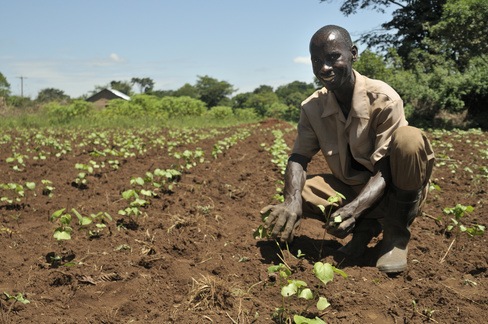
The Ghana Commodity Exchange has introduced an initiative that will make it possible for farmers to access loans from banks using their produce as collateral.
Under the initiative dubbed ‘Warehouse Receipts System’, farmers or traders who subscribe to the GCX platform will be granted a receipt covering their goods after depositing them at the various warehouses set up by the Exchange. The receipt can then be presented to banks to serve as collateral in the event that holders want to access loans.
Giving an insight into the initiative, Robert Dowuona Owoo-Acting Project Director, said consultations with the banks revealed that they [the banks] are eager to accept the Warehouse Receipts as collateral should the project take full flight
“We have spoken to a lot of the financial institutions and most of them are eager to be part of the warehouse financing system. Some of them are actually looking forward to be partner banks or settlement banks with the Ghana Commodity exchange,” he said.
Mr. Dowuona added that another function the GCX will serve is testing and grading the various products to be traded on the exchange, in order to assure and/or ensure quality of the commodities so that banks can make informed decisions based on the goods real value.
“Most of the banks we have spoken to also indicated that the reason they do not provide credit to farmers is because they have had challenges in being able to assess the goods’ quality, thereby making it difficult to know the true nature of the risk. But with the commodities exchange project the goods will be tested and graded, so the banks can now assess the commodities’ true value so they can assess the risk and know how much to give to the farmers,” Mr. Dowuona said.
Commenting on how the project will benefit them, Programmes Coordinator of the Peasant Farmers Association Charles Nnyaba said the project has come as a relief – citing the advantages it will bring them.
“A major problem farmers face has to do with lack of access to credit. But introduction of the Ghana Commodity Exchange will make it possible for farmers to access loans with the Warehouse Receipts that can be presented to the banks as collateral for a loan. So this is actually a good thing for us, and we are hopeful that it will work out well to solve our problem of access to credit,” he said.
He further added: “The problem we have with the banks is that they tell us there is no value for agricultural lands. So even those who have lands have had it difficulty using it to access loans at the banks. But with the Warehouse Receipts Systems, the product is already in the warehouse and serving as a guarantee for the banks – so that in case of any default in payment they won’t lose their money”.
Mr. Nnyaba further stated that apart from solving their problems of access to credit, warehouses provided by the GCX will also serve as storage facilities and access to market for them, something that has been a major problem for farmers in the country.
First in the West African sub-region, the Ghana Commodity Exchange launched in June 2014 with the aim of setting up a modern market system that would provide a platform for buyers and sellers to come together to trade, and be assured of quality delivery and payment.
According to Mr. Dowuona, the project is currently at its implementation stage and is expected to be in full operation by the first quarter of 2017.





